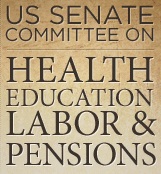 Hearing Description:
Hearing Description:
The Senate HELP Committee recently met to examine mental health treatment for children. The witnesses reported that the best course of treatment right now is using medication in conjunction with behavioral treatment and not just relying on drugs.
Hearing Date: February 25, 2014
Hearing Summary: Prepared for AAPS by the Market Institute
The Senate Health Education Labor and Pensions Committee recently met to examine the current mental health treatment options and trends. Chairman Tom Harkin (D-IA) said in his opening statement that despite important milestones in the fight for mental health like the Mental Health Parity Act and the Affordable Care Act, there is much to be done. There is a special urgency in identifying mental health issues because they typically manifest themselves in patients by the age of 24. Also, finding the right “patient driven care” can be paramount in making a profound difference in patients. There is no “one size fits all” solution to mental health care.
The first witness, William O. Cooper, M.D., M.P.H. , Professor of Pediatrics, Vanderbilt University Medical School testified in his opening statement that nearly 1 in 10 children suffer from a mental health disorder. There has been much progress in the past few years in identifying treatment options for children. However, since 50-75% of treatment occurs with a primary care physician, communication needs to still improve with mental health experts. Finally, there is an incidence of anti-psychotic medication being prescribed to children at a five-fold rate, but it is unlikely that better awareness is supporting that great of an increase.
The second witness, Benjamin S. Fernandez, M.S. Ed. , School Psychologist at Loudon County Public Schools in Ashburn, VA testified in his opening statement that educators play a significant role in ensuring that students’ experiences throughout their school careers contribute to their positive mental health. Providing access to school employed mental health professionals, and allowing them to function in the broad role in which they are trained, can ensure that the behavioral and mental health needs of all students are met.
The third witness, John K. Arch, Executive Vice President of Health Care and Director at the Boys Town National Research Hospital and Clinics in Omaha, NE testified in his opening statement that approximately 79% of the children that are admitted to their treatment center are being prescribed psychotropic medication at the time of admittance. They are concerned with the treatment of these kids using the drugs and the long term effects they may have. Their philosophy is to use medication in conjunction with behavioral and other treatment modalities. They support more research funding into understanding the effects of psychotropics
The fourth witness, Tiffany Martinez , Student at the University of Southern Maine testified in her opening statement that at the age of 17 she started showing signs of psychosis. Through support, an understanding clinical team, and a program aimed at helping people like herself, she eventually was able to get off medication. The treatment proved to her that early intervention works in mental health issues.
In response to questioning, William Cooper said:
- Even with the correct diagnosis, there is still a lack of access
- Providing local community providers with peer based information is central to improving mental health treatment
In response to questioning, Benjamin Fernandez said:
- School are the access point for students mental health care and there is a great need for more school-based mental health professionals
Hearing Website:
http://www.help.senate.gov/hearings/hearing/?id=b7f1350d-5056-a032-5216-4bb68fe0bcee
Links to Testimony:
William O. Cooper, M.D., M.P.H.
Professor of Pediatrics
Vanderbilt University Medical School, Nashville, TN
Benjamin S. Fernandez, M.S. Ed.
School Psychologist
Loudon County Public Schools, Ashburn, VA
John K. Arch, FACHE
Executive Vice President of Health Care and Director
Boys Town National Research Hospital and Clinics, Omaha, NE
Tiffany Martinez
Student, University of Southern Maine, Portland, ME




